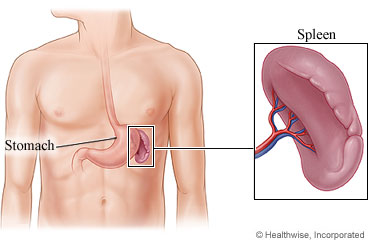Mononucleosis: Care Instructions

Overview
Mononucleosis, also called mono, is an infection that is usually caused by the Epstein-Barr virus. Mono is spread through contact with saliva, mucus from the nose and throat, and sometimes blood or semen.
You can get mono by kissing a person who is infected. Or you may get it by sharing a drinking glass or eating utensils with someone who has mono. That person may not be sick at the time or may have had mono long before.
Symptoms include a fever and a very sore throat. You may also have swollen glands and tonsils and feel weak and tired.
Mono may cause your spleen to swell. The spleen is an organ in the upper left side of your belly. A blow to the belly can cause a swollen spleen to break open. In very rare cases, the spleen may burst on its own.
Most people get better in 2 to 4 weeks. But it may take several more weeks before your normal energy is back. The lymph nodes in your neck may be larger than normal for a while. Getting lots of rest and keeping your schedule light will help you feel better. Time helps you recover.
Follow-up care is a key part of your treatment and safety. Be sure to make and go to all appointments, and call your doctor or nurse advice line (811 in most provinces and territories) if you are having problems. It's also a good idea to know your test results and keep a list of the medicines you take.
How can you care for yourself at home?
- Get plenty of rest. Stay in bed as much as you can until you feel well enough to be up.
- Drink plenty of fluids. If you have kidney, heart, or liver disease and have to limit fluids, talk with your doctor before you increase the amount of fluids you drink.
- Take your medicines exactly as prescribed. Call your doctor or nurse advice line if you think you are having a problem with your medicine.
- For a sore throat, suck on lozenges or gargle with salt water. To make salt water, mix 1 teaspoon (5mL) of salt in 1 cup (250 mL) of warm water.
- Take an over-the-counter pain medicine, such as acetaminophen (Tylenol), ibuprofen (Advil, Motrin), or naproxen (Aleve), for a sore throat or headache or to lower a fever. Read and follow all instructions on the label.
- Do not take two or more pain medicines at the same time unless the doctor told you to. Many pain medicines have acetaminophen, which is Tylenol. Too much acetaminophen (Tylenol) can be harmful.
- Do not play contact sports for 4 weeks. Do not lift anything heavy. Too much activity increases the chance that your spleen may break open (rupture).
- Try not to spread the virus to others. Do not kiss and don't share dishes, glasses, eating utensils, or toothbrushes for at least a few weeks. The virus is spread when saliva from an infected person gets in another person's mouth. It's hard to know how long you may be contagious.
- If you know you have mono, do not donate blood. There is a chance of spreading the virus through blood products.
When should you call for help?
Call 911 anytime you think you may need emergency care. For example, call if:
- You passed out (lost consciousness).
Call your doctor or nurse advice line now or seek immediate medical care if:
- You have new or worse belly pain.
- You have signs of needing more fluids. You have sunken eyes and a dry mouth, and you pass only a little urine.
- You are dizzy or light-headed, or you feel like you may faint.
- You cannot swallow fluids.
Watch closely for changes in your health, and be sure to contact your doctor or nurse advice line if:
- You do not get better as expected.
Where can you learn more?
Go to https://www.healthwise.net/patientEd
Enter Z786 in the search box to learn more about "Mononucleosis: Care Instructions".
Current as of: April 30, 2024
